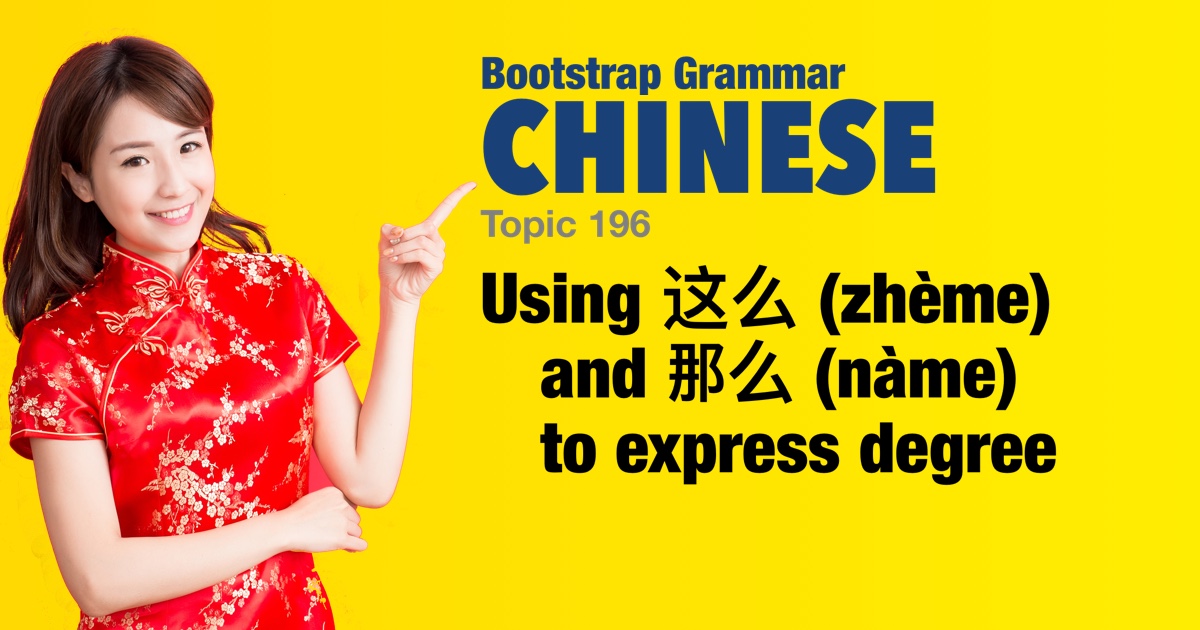Chinese grammar - Using 这么 (zhème) and 那么 (nàme) to express degree |
|||
|
|||
In Chinese, 这么 (zhème) and 那么 (nàme) are used to express degree, often to emphasize the extent or level of something. • 这么 (zhème) is used to indicate 'so' or 'this' when referring to something close to the speaker. • 那么 (nàme) is used to indicate 'so' or 'that' when referring to something further away from the speaker. That are also used to express admiration or criticism as in 'so good' or 'so bad'. |
| Examples: | |
|
这么好。
zhème hǎo. So good. |
|
|
那么远。
nàme yuǎn. So far. |
|
|
这个蛋糕这么好吃。
zhè ge dàngāo zhème hǎochī. This cake is so delicious. |
|
|
他这么聪明,为什么他没有通过考试?
tā zhème cōngmíng,#wèishénme tā méiyǒu tōngguò kǎoshì? He's so smart, why didn't he pass the exam? |
|
|
你为什么那么生气?
nǐ wèishénme nàme shēngqì? Why are you so angry? |
|
|
天气那么冷,我们还是呆在家里吧。
tiānqì nàme lěng,#wǒmen háishì dāizài jiālǐ ba. The weather is so cold, let's stay at home.
|
|
|
这么早,你就起床了。
zhème zǎo,#nǐ jiù qǐchuáng le. You got up so early. |
|
|
她的笑容那么美丽。
tā de xiàoróng nàme měilì. Her smile is so beautiful.
|
|
|
他这么努力工作,一定会成功。
tā zhème nǔlì gōngzuò,#yídìng huì chénggōng. He works so hard, he will definitely succeed. |
|
|
这么多人,我们怎么找他?
zhème duō rén,#wǒmen zěnme zhǎo tā? So many people, how can we find him? |
|
|
她唱歌唱得那么好,大家都喜欢听。
tā chànggē chàngde nàme hǎo,#dàjiā dōu xǐhuān tīng. She sings so well, everyone likes to listen.
|
|
|
这么简单的问题,你居然不会。
zhème jiǎndān de wèntí,#nǐ jūrán bú huì. Such a simple question, you actually don't know the answer.
|
|
|
那么远的地方,我们怎么去?
nàme yuǎn de dìfang,#wǒmen zěnme qù? Such a far place, how will we go there? |
|
|
他跑得那么快,我追不上。
tā pǎo de nàme kuài,#wǒ zhuībúshàng. He runs so fast, I can't catch up.
|
|
|
这么热的天,我们去游泳吧。
zhème rè de tiān,#wǒmen qù yóuyǒng ba. Such a hot day, let's go swimming. |
|
|
你为什么这么晚回来?
nǐ wèishénme zhème wǎn huílai? Why did you come back so late? |
|
|
那么多人喜欢他,他一定很特别。
nàme duō rén xǐhuān tā,#tā yídìng hěn tèbié. So many people like him, he must be very special. |
|
 |
|



